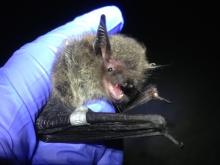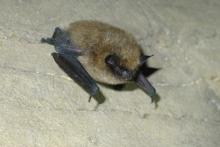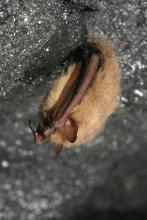Rabies
Rabies Alerts
Alexandria Health Department issued a rabies alert in November and two rabies alerts in October. Read the alerts and guidance for the public.
What is Rabies and How is It Transmitted?
Rabies virus is a fatal but preventable disease that only affects mammals. The rabies virus is transmitted through direct contact (via broken skin or mucous membranes in the eyes, nose or mouth) with saliva or brain/nervous system tissue from an infected animal. This can happen when infected animals bite or scratch others.
After exposure, the rabies virus must first make contact with the brain to bring on any symptoms. The distance from where the animal was exposed to the brain can influence how long it takes for the virus to develop in the body. This can take weeks or months.
Early symptoms are flu-like including general fatigue, fever, and headache lasting a few days. Soon more serious symptoms set-in with the individual experiencing cerebral dysfunction, agitations, hallucinations (seeing things), and hydrophobia (fear of water). Rabies is usually always fatal once symptoms have commenced. All mammals including domestic dogs and cats can be infected with rabies and pass on rabies.
How to Protect Yourself and Your Pets from Rabies (How Can I Prevent Rabies?)

Rabies cases among humans in this country are rare due to the improved rabies vaccination programs for pets and for people who are bitten.
The best way to prevent the spread of rabies to humans and to pets is by keeping pets properly vaccinated, along with control of stray dogs, cats, and wildlife that can carry disease.
- Ensure that your pets are up-to-date with their rabies vaccine. By law, all dogs, cats and ferrets must be vaccinated against rabies.
- Keep your distance from any animal that you are not familiar with including wildlife, and other stray pets.
- Always keep direct supervision/control of your pets when outdoors.
- Avoid high-risk animals including raccoons, bats, foxes, and skunks.
- Teach children to stay away from unfamiliar animals.
What To Do if Bitten?

Don’t panic, but don’t ignore the bite, either.
- Wash the wound thoroughly with soap and lots of water. Washing thoroughly will greatly lessen the chance of infection. Give first aid as you would for any wound.
- If possible, capture the animal under a large box or can, or at least identify it before it runs away. Don’t try to pick the animal up. Call Animal Control at 703.746.4444 to pick it up.
- If bitten by someone else's pet, ask for the owner's contact information so Animal Control can follow up on the vaccination status of the pet. This could save you the time and money of getting unnecessary rabies treatment.
- If you or a family member was bit, go to the Emergency Room and explain how the bite happened. Please note, primary care providers don't usually have the necessary anti-rabies treatment recommended by the Centers for Disease Control and Prevention. After your ER visit, follow up with your primary care provider. If a pet was bitten, call your veterinarian.
- Report the bite to the health department where you live. Alexandria Health Department is available during normal business hours at 703.746.4910.
Your physician and/or a state or local health department official will determine whether you need a rabies vaccine. They will make this decision based on how you were exposed, the animal you were exposed to, and laboratory and surveillance information for the area where the exposure occurred.
What is PEP?
Rabies post-exposure prophylaxis (PEP) is recommended when you have been bitten or scratched by an animal suspected of having rabies. Treatment consists of one dose of human rabies immune globulin (HRIG) and four doses of rabies administered over a two-week period. Individuals who have been previously vaccinated should receive the vaccine only. The use of PEP makes rabies completely preventable.
Bats & Rabies
Contrary to popular belief, bats are not out to harm people. Bats are nocturnal, and live in colonies that roost and reproduce within caves, trees, and abandon structures. Each night, bats can consume hundreds of insects (like mosquitoes) playing a vital role in our ecosystem. The Common Wealth of Virginia has documented 16 different species of bats, with a number of them being endangered or threatened species. While bats try to avoid people some may unintentionally come a bit too close for comfort. This usually occurs when a bat has made its residence in an occupied building or is sick.


Virginia Department of Wildlife Resources. https://dwr.virginia.gov/wildlife/information/eastern-small-footed-bat/

Heritage program. https://guides.nynhp.org/tri-colored-bat/
- If you come into close proximity with a bat and observe the following, maintain your distance:
- Active during the day
- Unable to fly
- Found in an unusual place (inside your home, or yard)
- Remember that rabies can only be confirmed in a bat through laboratory testing. This is why maintaining your distance and avoiding contact is best practice.
- What happens if you find a bat inside your home?
- Do not interact with the bat.
- Confine the bat to a single room and open windows to allow the bat to fly out[MS1] .
- If the bat does not leave, call Animal Control (Animal Welfare League of Alexandria) at 703-746-4774 to assist with removal.
- Release the bat only if you are certain there has been no exposure to the bat.
- If you suspect you or your pets had exposure to the bat, the animal should be captured and sent out for testing.
- How to safety capture a bat.
- Use heavy-duty gloves and long sleeves, do not handle bat with bare hands.
- Wait until the bat settles and then cover it with a cardboard box or other sturdy container.
- Slide a piece of cardboard or firm material under container, flip over slowly, and close without allowing bat to escape.
- Release the bat at nightfall and far away from your home if possible.
- If you suspect exposure or there is any doubt contact, the AWLA and the bat will be sent for testing.